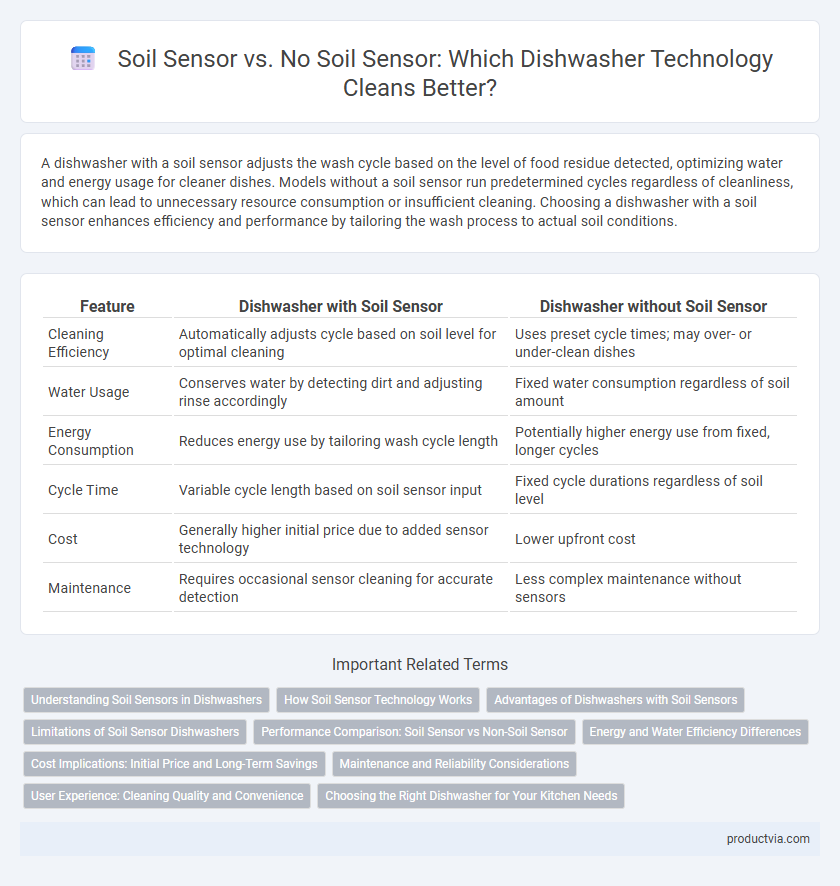A dishwasher with a soil sensor adjusts the wash cycle based on the level of food residue detected, optimizing water and energy usage for cleaner dishes. Models without a soil sensor run predetermined cycles regardless of cleanliness, which can lead to unnecessary resource consumption or insufficient cleaning. Choosing a dishwasher with a soil sensor enhances efficiency and performance by tailoring the wash process to actual soil conditions.
Table of Comparison
| Feature | Dishwasher with Soil Sensor | Dishwasher without Soil Sensor |
|---|---|---|
| Cleaning Efficiency | Automatically adjusts cycle based on soil level for optimal cleaning | Uses preset cycle times; may over- or under-clean dishes |
| Water Usage | Conserves water by detecting dirt and adjusting rinse accordingly | Fixed water consumption regardless of soil amount |
| Energy Consumption | Reduces energy use by tailoring wash cycle length | Potentially higher energy use from fixed, longer cycles |
| Cycle Time | Variable cycle length based on soil sensor input | Fixed cycle durations regardless of soil level |
| Cost | Generally higher initial price due to added sensor technology | Lower upfront cost |
| Maintenance | Requires occasional sensor cleaning for accurate detection | Less complex maintenance without sensors |
Understanding Soil Sensors in Dishwashers
Soil sensors in dishwashers detect the level of food residue and adjust the wash cycle accordingly, optimizing water and energy use while ensuring thorough cleaning. Models without soil sensors operate on preset cycles, potentially using excess resources or leaving dishes less clean depending on soil levels. Incorporating soil sensors enhances dishwasher efficiency by tailoring wash intensity to actual soil conditions, reducing waste and improving overall performance.
How Soil Sensor Technology Works
Soil sensor technology in dishwashers detects the level of food particles and grease in the wash water by using optical or conductivity sensors, allowing the machine to adjust cycle duration and water temperature for optimal cleaning. Without a soil sensor, dishwashers operate on preset cycles regardless of how dirty the dishes are, potentially wasting water and energy or leaving residue. Soil sensors enhance efficiency by tailoring wash intensity to real-time soil conditions, reducing water and energy consumption while ensuring thorough cleaning.
Advantages of Dishwashers with Soil Sensors
Dishwashers with soil sensors optimize water and energy consumption by detecting the level of food residue on dishes, ensuring a tailored cleaning cycle that avoids over-washing. This intelligent technology enhances cleaning efficiency, reduces water waste, and prolongs the appliance's lifespan through precise adjustments. Soil sensor-equipped dishwashers deliver consistently spotless results while minimizing environmental impact compared to models without this advanced feature.
Limitations of Soil Sensor Dishwashers
Soil sensor dishwashers detect food residue levels to adjust washing cycles, but they may struggle with highly greasy or protein-based soils, leading to incomplete cleaning. Sensors can misinterpret mixed soil types or heavy stains, causing longer cycle times and increased water and energy consumption. This technology also tends to be less effective with delicate or unevenly soiled dishes, limiting overall cleaning efficiency.
Performance Comparison: Soil Sensor vs Non-Soil Sensor
Dishwashers equipped with soil sensors adjust water usage and cycle duration based on the detected dirtiness of dishes, resulting in optimized cleaning performance and energy efficiency. In contrast, non-soil sensor models operate on fixed cycles that may either overuse resources or underperform on heavily soiled loads. Soil sensor technology enhances overall cleaning effectiveness by preventing under or over-washing, contributing to better water conservation and cost savings.
Energy and Water Efficiency Differences
Dishwashers equipped with soil sensors detect the level of food residue on dishes and adjust the wash cycle accordingly, significantly reducing water and energy consumption by avoiding unnecessary extended cycles. In contrast, dishwashers without soil sensors operate on fixed cycles regardless of soil level, often using more water and electricity than needed. Energy Star rated dishwashers with soil sensors typically achieve up to 20% greater energy efficiency and use 15% less water compared to models lacking this technology.
Cost Implications: Initial Price and Long-Term Savings
Dishwashers with soil sensors generally have a higher initial price, reflecting advanced technology that detects food residue levels and adjusts wash cycles accordingly. This feature can lead to long-term savings on water, electricity, and detergent by optimizing cycle duration and intensity. Conversely, models without soil sensors tend to be more affordable upfront but may incur higher operating costs due to less efficient use of resources.
Maintenance and Reliability Considerations
Dishwashers equipped with soil sensors adjust wash cycles based on the level of food residue detected, reducing wear on internal components by preventing over-washing and minimizing detergent buildup, which enhances long-term reliability. Models without soil sensors rely on preset cycles that may cause unnecessary mechanical strain and potential clogging, increasing maintenance frequency and risk of parts failure. Choosing a dishwasher with an advanced soil sensor system can lead to lower maintenance costs and improved durability by optimizing water usage and cycle duration according to soil levels.
User Experience: Cleaning Quality and Convenience
Dishwashers with soil sensors adjust water temperature and cycle duration based on the detected dirt level, enhancing cleaning quality by targeting tough stains more effectively. This technology reduces water and energy consumption, offering greater convenience by minimizing the need for manual cycle selection or pre-rinsing. In contrast, dishwashers without soil sensors operate on fixed cycles, which may lead to inconsistent cleaning results and potentially longer wash times or higher resource use.
Choosing the Right Dishwasher for Your Kitchen Needs
A dishwasher equipped with a soil sensor adjusts the wash cycle based on the dirtiness of dishes, ensuring optimal cleaning performance and water efficiency. Models without soil sensors rely on preset cycles that may consume more resources and potentially miss thorough cleaning for heavily soiled items. Selecting a dishwasher with a soil sensor can enhance energy savings and cleaning effectiveness, making it ideal for kitchens with varying dishwashing needs.
Soil Sensor vs No Soil Sensor for Dishwashers Infographic

 productvia.com
productvia.com